Project Manager: Awejan Emmanuel
Project Coordinator: Ngonge Meiva
Project Sponsor: GoGreen Technologies(GG TECH)
Project patner(s): European Union Green Week
Resource Manager: Mapong Louise
Project Duration: 2 months
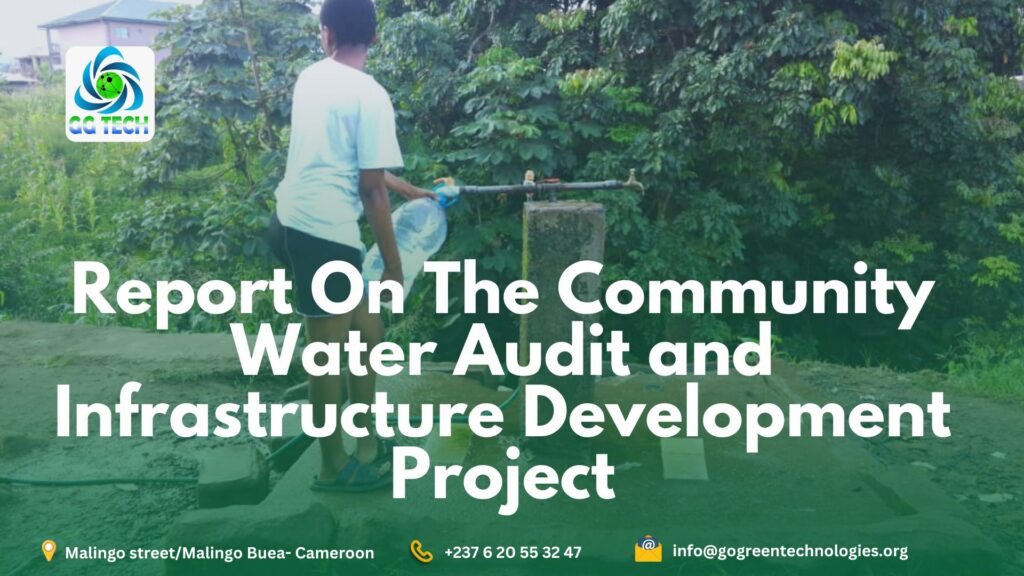
Introduction
The “Community Water Audit and Infrastructure Development” project was initiated to improve water quality and access in remote parts of Buea, located in the Southwest region of Cameroon. This initiative aimed to advance community health by conducting a thorough assessment of the city’s water infrastructure, repairing damaged public taps in remote areas, donating water purifying agents to hostels, holding workshops on water conservation, and running online public awareness campaigns. The ultimate goal was to ensure that the remote areas, regardless of their location, has access to clean and safe drinking water, thereby promoting overall community well-being.
Project Objectives
The primary objectives of the “Community Water Audit and Infrastructure Development” project were as follows:
1. Comprehensive Water Infrastructure Evaluation: Conduct a detailed evaluation of the city’s water infrastructure to identify and prioritize areas in need of repair, with a particular focus on broken public taps in remote areas.
2. Provision of Water Purifying Chemicals: Distribute water purifying chemicals, such as chlorine, to 20 hostels with water tanks. Provide clear guidelines on their proper usage to enhance water quality and improve the health of hostel occupants.
3. Educational Workshops: Organize workshops for community members to educate them on water conservation techniques, factors affecting water quality, and the importance of water resilience.
4. Online Public Awareness Campaigns: Utilize GoGreen Technologies’ social media platforms to launch public awareness campaigns aimed at educating the community on water conservation and encouraging active participation in water quality improvement initiatives.
Host Organization: GoGreen Technologies
Executive Summary of Organization
GoGreen Technologies is a non-governmental organization dedicated to empowering youth to succeed in today’s challenging world. Our mission is to inspire young people across various fields, including entrepreneurship, digital technology, leadership, agriculture, education, and volunteerism. At GoGreen Technologies, we strive to cultivate a new generation of leaders who view leadership as a responsibility rather than an option.
Organization Objectives
- Empower Youth with Environmental Knowledge: To provide training and education to young people, enabling them to become environmentally conscious builders capable of creating sustainable livelihoods.
- Promote Technological Sustainability: To educate youth on technological sustainability, encouraging positive impacts in the digital realm and fostering responsible use of technology.
- Cultivate Leadership Skills: To awaken and develop leadership skills and potentials in young individuals, preparing them to guide and influence future generations.
- Enhance Community Health and Well-being: To improve community health and well-being by ensuring access to clean and safe drinking water through infrastructure development and public education on water conservation.
- Support Sustainable Practices: To advocate and support sustainable practices within communities, particularly in water management and conservation, contributing to long-term environmental resilience and sustainability.
Organization Capacity
GoGreen Technologies boasts a team of highly skilled and knowledgeable employees committed to project execution. We prioritize close observation, information exchange, and prompt responses to ensure effective project completion. Our mission is to enhance young people’s digital capacities and skills through constant support for their growth.
Partnership Organization: European Union Green Week
The European Union partnered with GoGreen Technologies to support the “Community Water Audit and Infrastructure Development” project. This collaboration provided the necessary resources and expertise to ensure the successful implementation of the project’s activities and objectives. The EU’s involvement was crucial in providing, technical expertise, and a platform for broader community engagement.
EU Green Week Objective
- Promote Water as a Vital Shared Resource: To emphasize the importance of water as a crucial resource that must be preserved and passed down through generations. This includes recognizing its essential role for people, the environment, and the development of a sustainable and resilient economy.
- Raise Awareness on Water-Resilience: To increase awareness about the need for water-resilience, particularly in the face of rising natural disasters such as droughts and floods. Highlight the impacts of these events on the EU’s water challenges and the necessity for preparedness and adaptation.
- Address Mismanagement and Pollution: To confront the issues of mismanagement, pollution, and ecosystem degradation that have strained water resources over the past decades. Promote policies and practices that ensure better management and protection of water resources.
- Combat Climate Change and Biodiversity Loss: To address the intertwined crises of climate change and biodiversity loss, recognizing their collective impact on the water cycle. Promote actions that mitigate climate change, restore ecosystems, and thereby bring balance to the water cycle.
- Enhance Public Engagement and Policy Advocacy: To engage citizens and policymakers across Europe in discussions and initiatives aimed at protecting water resources. Encourage collective action and policy reforms that support water conservation, sustainable management, and resilience against environmental challenges.
- Foster Sustainable Water Practices: To promote sustainable water practices that ensure the long-term availability and quality of water. This includes encouraging innovative solutions, supporting research, and fostering community-based initiatives that contribute to water sustainability and resilience.
EU Green Week Capacity
EU Green Week is an annual opportunity to raise awareness, promote and discuss European environmental policy. Organised by the European Commission’s Directorate-General for Environment, this high-level event attracts policymakers, leading environmentalists, stakeholders, and interested parties from across Europe and the globe.
For more information, please click on the link that follows: https://green-week.event.europa.eu/index_en
Project Development
The “Community Water Audit and Infrastructure Development” project development phase involved meticulous planning and strategizing the various activities required to achieve the project’s objectives. This phase included:
- Identifying Areas for Improvement: Detailed surveys and assessments were conducted to identify areas in Buea with significant water infrastructure challenges, particularly focusing on broken public taps in remote areas.
- Planning Workshops and Campaigns: Workshops and public awareness campaigns were meticulously planned, ensuring they would be engaging, informative, and impactful.
- Establishing a Timeline: A comprehensive timeline was established to ensure all activities were carried out efficiently and effectively within the project’s duration.
Activities Carried Out
The “Community Water Audit and Infrastructure Development” project in Buea was meticulously developed through stages including planning, resource allocation, stakeholder engagement, and community involvement. A comprehensive needs assessment was conducted to identify water infrastructure challenges, followed by stakeholder meetings with local authorities and educational institutions. Community involvement was fostered through workshops and sensitization sessions on water conservation and purification, alongside online public awareness campaigns. Despite financial constraints preventing the distribution of purification items, a round table discussion and social media initiatives were used to address critical issues and raise awareness. Overall, the project effectively engaged the community and promoted sustainable water practices. These activities included:
1. Community patrol
Date: June 5th and 7th
Location: Neighbourhood of Ndongo Buea
Attendance: 5 GoGreen Technologies members
The community patrol was a vital component of the “Community Water Audit and Infrastructure Development” project. Conducted by GoGreen Technologies, the patrol involved visiting remote areas in Buea to assess and document the condition of public water taps.
During these visits, the team educated residents on the consequences of damaged taps and provided practical advice on how to remediate these issues. The patrol successfully raised awareness about the importance of maintaining water infrastructure and empowered the community with knowledge to take proactive steps in ensuring their access to clean water.
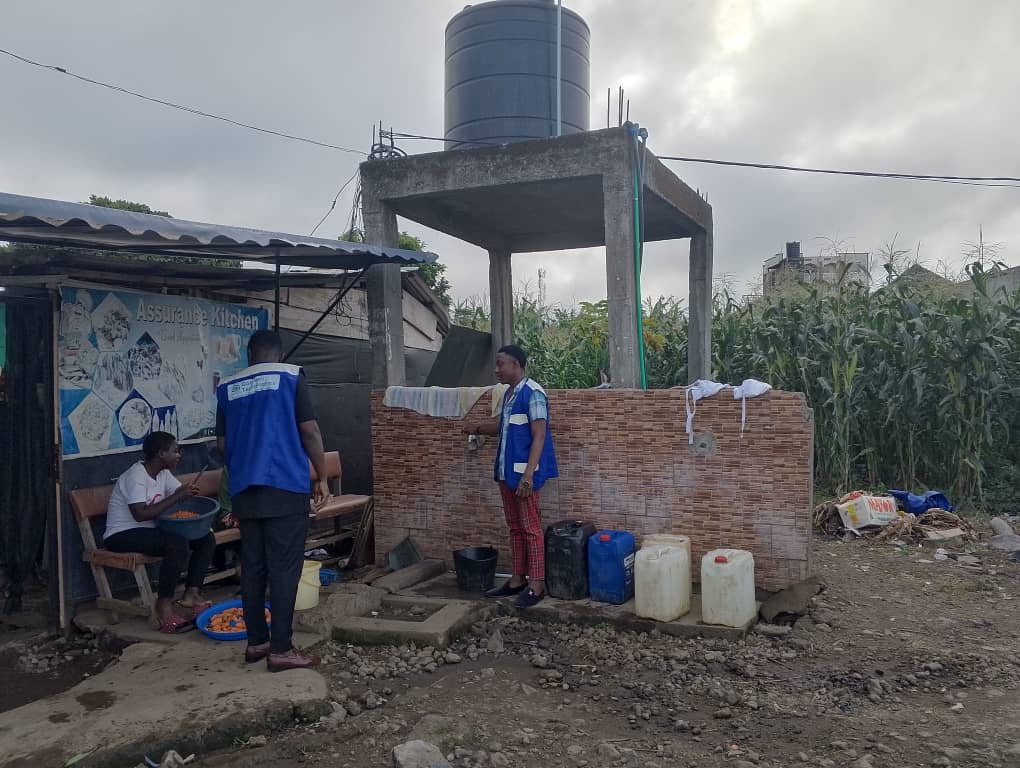
Through direct engagement as seen in the image above, the patrol fostered a sense of responsibility among residents, contributing to the project’s overall goal of improving water quality and advancing community health.

2. Roundtable discussion: Critical Challenges Facing Water Infrastructures Across Africa
Date: June 11, 2024
Venue: GGTECH office
Time: 10 AM to 1 PM.
Attendance: 7 environmental ambassadors
Overview:
A roundtable discussion was held to highlight the critical challenges facing water infrastructures in Buea, Cameroon, and across Africa. This discussion was initially planned as a webinar but was adapted to a roundtable format due to persistent network issues.
Key Points Discussed:
Sustainable Practices: Environmental ambassadors emphasized the urgent need for sustainable practices to preserve and enhance water resources. Neglecting maintenance, inefficient water usage, and contamination were identified as detrimental habits contributing to infrastructure decay and water scarcity.
Maintenance and Usage: The discussion highlighted the importance of regular maintenance of water systems and efficient water usage to prevent contamination and infrastructure decay.
Conclusion:
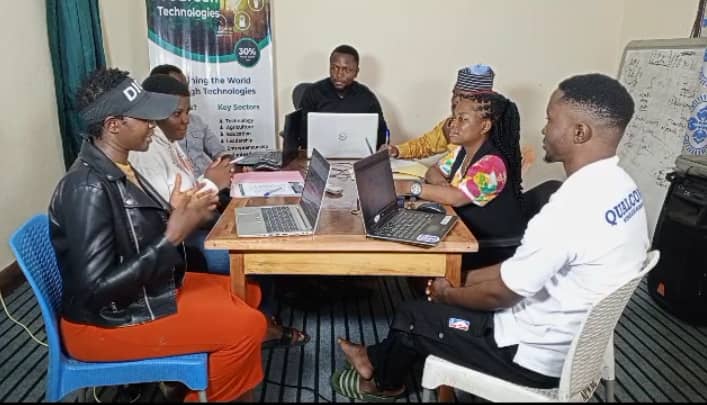
The session as seen in the image above concluded with a commitment to urge the public to adopt responsible habits, including regular maintenance of water systems, avoiding water wastage, and supporting initiatives for clean water access.
Call to Action:
Collective action is essential to safeguard water infrastructures, ensure resilience, and improve community well-being in Buea and beyond.
- To achieve this, regularly maintain water systems by checking and repairing public taps, adopt water-saving habits, and practice effective water purification methods.
- Support community initiatives by participating in local clean water projects, volunteering for community patrols, and donating to related organizations.
- Raise awareness through social media, discussions, and workshops, and advocate for policy changes that promote sustainable water management. By taking these steps, we can ensure the resilience of our water infrastructures and build a sustainable future.
3. Sensitization Campaign on Effective Water Purification Methods at the University of Buea
Date: June 18, 2024
Venue: University of Buea
Time: 9 AM to 1 PM
Attendance: About 715 youths
Overview:
GoGreen Technologies conducted a sensitization campaign to promote effective water purification methods among the youth. Interactive sessions were held across three halls, where students actively participated by suggesting and discussing various water purification techniques.
Key Points Discussed:
- Health Benefits: The campaign educated participants on the health benefits of water purification, such as reducing the risk of waterborne diseases like cholera and typhoid.
- Environmental Benefits: The environmental benefits of cleaner water sources, including the preservation of local ecosystems and biodiversity, were also highlighted.
- Best Practices: Several effective and locally viable water purification methods were identified, including boiling, cloth filtration, Moringa Oleifera seed powder, and filtration using ceramic or sand filters.
Conclusion:
Participants pledged to implement these methods, ensuring safer drinking water practices within the community.
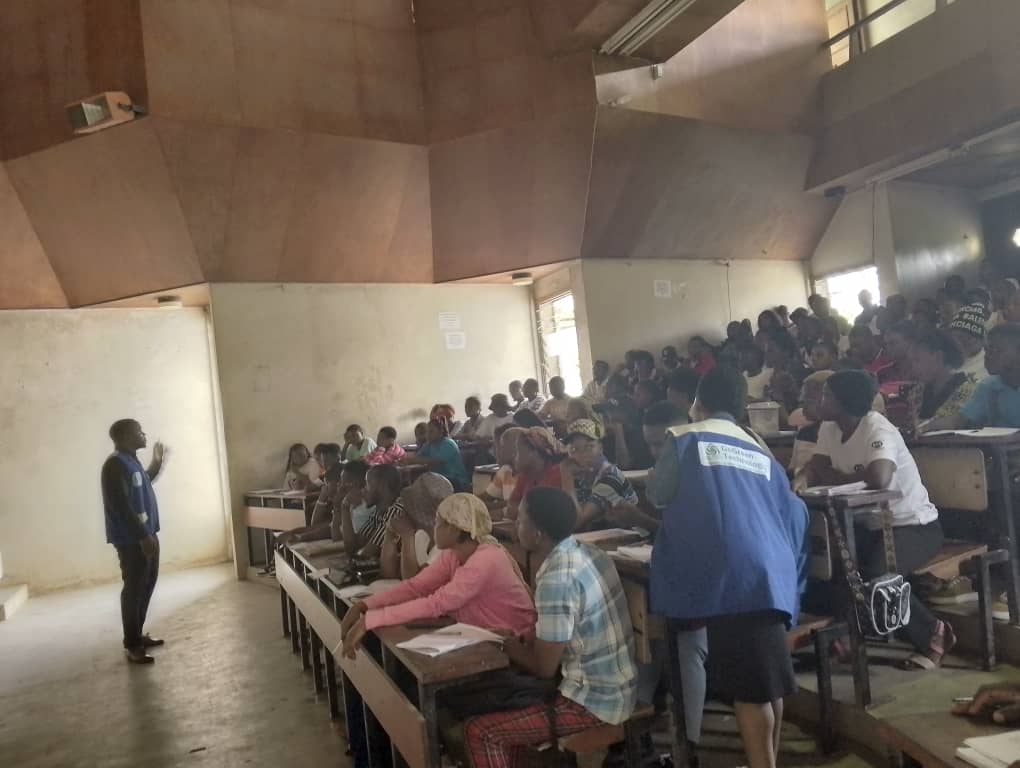
This campaign successfully engaged and educated young minds on sustainable water management practices, highlighting the importance of purification for both health and environmental preservation.
4. Sensitization campaign: Exploring Water Resilience and Its Importance in Ensuring Sustainable Water Management Practices
Date: June 25, 2024
Venue: University of Buea.
Time: 09AM to 1PM
Attendance: about 537 youths
Overview:
An educational campaign titled “Exploring Water Resilience and Its Importance in Ensuring Sustainable Water Management Practices” was organized. The event aimed to raise awareness among students about the concept of water resilience and its crucial role in sustainable water management.
Key Points Discussed:
- Importance of Water Resilience: The campaign emphasized the need for resilient water systems to ensure consistent access to clean water amidst environmental challenges like population growth and climate change.
- Sustainable Practices: Participants engaged in brainstorming sessions to identify sustainable practices that enhance water resilience, including effective water purification methods, water conservation strategies, and community-based initiatives for rainwater harvesting and groundwater recharge.
Conclusion and Commitment:
Participants resolved to support and incorporate sustainable practices into their daily lives, contributing to robust water systems capable of enduring environmental challenges.
Impact:
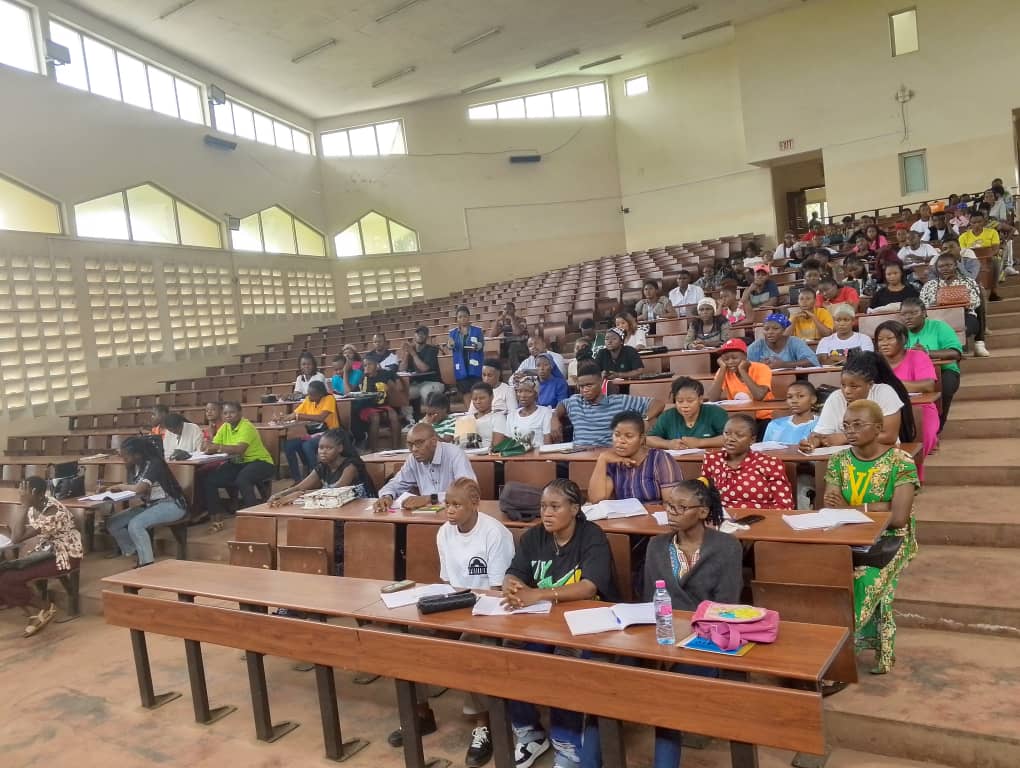
The campaign equipped young leaders at the University of Buea with the knowledge to promote sustainable water management practices, fostering a sense of responsibility towards preserving water resources for future generations.
5. Roundtable discussion: Evaluation, reporting and official closing of project
Date: 07/07/2024
Venue: GoGreen Technologies office
Time: 10 AM- 12:30PM
Attendance: 7 environmental ambassadors
Overview
The session was attended by both members and stakeholders, reflecting the community’s interest and involvement in the “Community Water Audit and Infrastructure Development” project. The aim of the session was to review the project’s achievements, discuss challenges encountered, and suggest ways to improve future initiatives.
Key points discussed
1. Evaluation
Trust Issues with Water Purification Items: One significant challenge discussed was the scepticism and trust issues among hostel inhabitants regarding the distribution of water purification items(e.g chlorine). Despite the good intentions, many residents were reluctant to accept the items due to concerns about their safety and effectiveness.
Suggestions for Remediation:
- Educational Campaigns: Increase educational efforts to inform residents about the safety and benefits of the water purification kits. This can include demonstrations, testimonials from trusted community members, and detailed information about the science behind the purification process.
- Partnerships with Local Leaders: Engage local leaders and influencers who can vouch for the safety and efficacy of the purification items. Their endorsement can help build trust within the community.
- Transparency and Accountability: Ensure transparency in the distribution process and provide clear instructions and support for using the purification chemicals. Regular follow-ups and feedback mechanisms can also help address any concerns residents may have.
2. Public Mishandling of Public Taps
The key points discussed also highlighted the issue of public taps getting damaged easily due to mishandling. This misuse leads to frequent breakdowns and a lack of access to clean water for many residents.
Suggestions that were made for Remediation:
- Community Education: Conduct regular workshops and awareness campaigns to educate the community on the proper use and maintenance of public taps. Emphasize the importance of these facilities and the impact of mishandling on the entire community.
- Installation of Durable Taps: Invest in more durable and tamper-proof public taps that can withstand heavy usage and reduce the frequency of repairs.
- Community Monitoring and Reporting: Establish a community monitoring system where residents can report damages and misuse of public taps. Create a sense of ownership and responsibility among the community members to safeguard these facilities.
3. Reporting on Campaign Reach
Online Campaigns
The online public awareness campaigns, conducted through GoGreen Technologies’ social media platforms (Facebook and LinkedIn), were successful in reaching a wide audience. The informative posts on water conservation and water quality garnered significant engagement from the community.
Online Reach Statistics:
- Facebook: Reached approximately 3,370 individuals.
- LinkedIn: Connected with 117 professionals.
Onsite Campaigns
The onsite campaigns, community patrol and sensitization sessions, effectively engaged the community, particularly the youth. These events provided hands-on learning experiences and facilitated direct interactions between the project team and the community members.
Onsite Reach Statistics:
- Sensitization Sessions: Engaged over 1,321 participants, including students from the University of Buea and residents of local hostels.
- Community patrol and round tables: Attended by 47 participants, including environmental ambassadors and local community leaders.
4. Conclusion
The “Community Water Audit and Infrastructure Development” project successfully raised awareness about water conservation and quality, improved infrastructure in remote areas, and engaged the community in meaningful discussions about water management. However, challenges such as trust issues with water purification items and the mishandling of public taps were identified.

The closing session concluded with a commitment to incorporate these recommendations in future projects to further enhance the impact and sustainability of GoGreen Technologies’ initiatives. The project team expressed gratitude to all participants and stakeholders for their support and involvement, emphasizing the collective effort required to achieve lasting change in water management and community health.
Project Process
The “Community Water Audit and Infrastructure Development” project was carried out over a span of four weeks, with specific activities planned for each week:
WEEK 1: June 4th – June 10th
- Community Patrols: Conducted patrols to explain the consequences of damaged public taps to the community and provide advice on remediation methods. The pictudre below shows an image that was taken during one of the community patrols.

- Infrastructure Evaluation: Conducted a comprehensive evaluation of the city’s water infrastructure, focusing on broken public taps in remote areas. This involved physically assessing the current infrastructure, recording findings, and determining necessary repairs. The image below is one of the damage public taps identified in the Ndongo neighborhood.
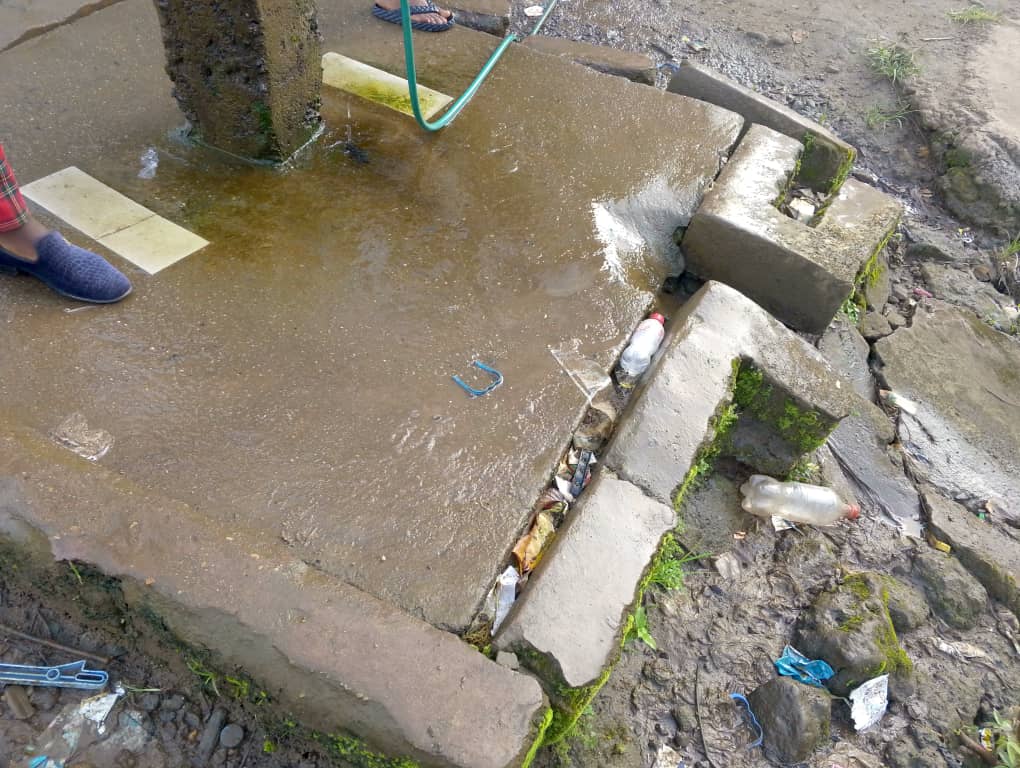
- Online Awareness Campaigns: Launched online public awareness campaigns through GoGreen Technologies’ social media platforms (Facebook, Instagram, and LinkedIn). This included creating informative posts, and infographics to educate followers about the importance of water conservation and encourage them to take action in their daily lives
WEEK 2: June 11th – June 17th
- Round table discussion with environmental ambassadors that emphasized the urgent need for sustainable practices to preserve and enhance water resources.
- Online awareness campaigns
WEEK 3: June 18th – June 24th
- Educational Campaign: a campaign was carried out to educate community members especially the youths on water conservation techniques, factors affecting water quality, and water resilience topics. These workshops were interactive and engaging, featuring presentations, discussions, and hands-on activities to promote active learning and knowledge retention among participants.
- Online Awareness Campaigns: Launched online public awareness campaigns through GoGreen Technologies’ social media platforms (Facebook, Instagram, and LinkedIn). This included creating informative posts, and infographics to educate followers about the importance of water conservation and encourage them to take action in their daily lives.
WEEK 4: June 25th – July 1st
- Educational campaign was organized to explore water resilience and its importance in ensuring sustainable water management practices.
- Evaluation session
- Online Awareness Campaigns: Launched online public awareness campaigns through GoGreen Technologies’ social media platforms (Facebook, Instagram, and LinkedIn). This included creating informative posts, and infographics to educate followers about the importance of water conservation and encourage them to take action in their daily lives.
Delivery of Project
The project was successfully delivered, with most planned activities completed. However, some activities, such as the live streams, distribution of purification items to 20 hostels and renewal of identified damaged public taps, were not carried out due to network disturbances, trust issues and logistical challenges respectively. Instead, during patrols and infrastructure evaluation, the team explained the consequences of damaged taps to the community and provided ways to remediate them. The project delivery was well-coordinated, ensuring maximum community engagement and impact.
Project Evaluation
The project evaluation involved assessing the effectiveness of the activities carried out and their impact on the community. Feedback was collected from participants in the roundtable session and sensitization campaigns to gauge the level of knowledge transfer and community engagement. The evaluation focused on the following aspects:
- Effectiveness of Educational campaigns: Participants’ understanding of water conservation techniques, water quality factors, and resilience topics.
- Impact of using natural methods to purify water: Improvement in water quality and health outcomes among youths.
- Reach and Engagement of Online Campaigns: Community engagement metrics from social media platforms.
Outcomes of the Project
- Improved Access to Clean Water: Accessibility and functionality of public taps in remote locations were enhanced from the community Patrols
- Increased Awareness and Understanding: Community members gained a better understanding of water conservation methods, factors affecting water quality, and the importance of water resilience.
- Greater Community Involvement: The project fostered greater community involvement and engagement in initiatives to build water resilience and improve water management techniques.
Some Successes of the Project
- Educational campaigns: Successfully conducted roundtable session and sensitization campaigns, engaging and educating a significant number of community members and students.
- Awareness Campaigns: Raised awareness about the importance of water resilience and sustainable water management practices through interactive sessions and online campaigns. This initiative did not only get to Cameroonians, but to other parts of Africa as shown in the image below.
- Reawakening of better and safer water purification methods
- Reawakening the concept of water resilience.

According to the audience data o Facebook as seen in the image above, 33% of our audience is from Cameroon, the country where the “Community Water Audit and Infrastructure Development” project is headquartered. This indicates that our project has considerable local engagement. This suggests a great deal of interest and perhaps support from the community. Notable regional and worldwide interest is also observed, namely from Ethiopia (6%), Nigeria (8%), and other nations like Kenya and India. This varied audience raises the possibility of more extensive cooperation and outreach, which would increase the project’s influence on a local and international level.
Onsite outreach: about 1,368 participants.
Online outreach: 3,487 person’s reach
Facebook and Instagram

According to the data, the project’s internet reach increased significantly during the first ninety days, reaching 3,370, a +780% increase over the previous ninety days. The graph showed two significant engagement spikes, one in early June and the other in early July, indicating that the educational campaigns which were posted during those periods were successful in drawing in viewers. This impressive expansion showed how well the recent efforts had worked to increase awareness and broaden the project’s influence.

From the image above, the engagement rate from June 11 to July 8 is depicted in the graph. Twice, around June 16 and June 20, the engagement rate peaked, with the highest value coming in at slightly over 100. With the exception of a few small variations in early July, the engagement rate declined sharply following these peaks and stayed low for the remainder of the time. According to this pattern, the audience’s interest in some activities or content peaked around mid-June and then declined. This shows that the project’s activities need to be sustained or reignited after those peak times.
Drawbacks of the Project
- Network Disturbances: Persistent network disturbances prevented the execution of planned live streams, limiting the reach of some educational content.
- Logistical Challenges: Logistical challenges hindered the renewal of identified damaged public taps and the distribution of water purification chemicals to 20 hostels as planned. Instead, the community was educated on the consequences and provided with remediation advice.
- Trust issues: the inhabitants of the 20 hostels whose water tanks were identified as cases that needed water purification, refused take the purification items we were offering to them despite the fact that we thought them and guided them on how to use it.
Recommendations for Future Projects:
- Enhance Trust Building Measures: Implement robust educational campaigns, partner with local leaders, and ensure transparency in the distribution of water purification items.
- Promote Proper Use of Public Infrastructure: Conduct continuous community education on the proper use of public taps, invest in durable infrastructure, and establish community monitoring systems.
- Expand Reach and Engagement: Continue leveraging both online and onsite platforms to reach a broader audience and ensure that the community remains engaged and informed.
Click Here to discover more on this project.
Learn more about GoGreen Technologies
Contact us Here
Or you can Join forces with us
